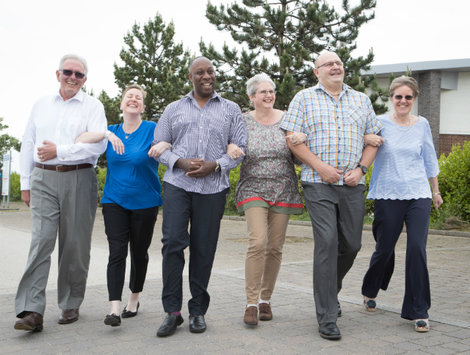How friendships can benefit your mental health
Updated: 28 Jan 2025
We laugh with friends, we cry with friends and we experience life with friends. But, other than having a partner in crime, friendships are much more valuable than we think. Dean Duggan explains...

Beyond the happy memories, building a strong support network is one of the most important factors in helping us maintain positive mental health.
Whereas loneliness and isolation can trigger feelings of depression and anxiety, building friendships help us to form the foundations by which we learn how to interact in social situations, and deal with the negativity that life throws at us.
Friendships are by no means the ultimate cure for poor mental health, however studies have shown that having a good circle of friends around you helps you get more out of life and make life more enjoyable. In short, good friends are powerful things.
Four ways friends matter
1. They encourage us to be more social
It’s easy for us to hide away when life is happening around us. We avoid invitations to special occasions or make up excuses for why we can’t attend. This is where your friends step in. They push you out of your comfort zone and encourage you to try new things, to be more active and to socialise. It’s this simple pleasure of being in the company of someone you know and trust that raises your spirits and makes the serious side of life more bearable.
2. They help us see reality
Whether you’ve had an argument with a family member or had a bad experience at work, it can be difficult to get a true perspective on the situation. Friends help us stay grounded and look at things from different points of view. They understand the importance of being honest with you, but not in a way that will hurt you. They approach sensitive issues with kindness and understanding, whilst helping you gain clarity, otherwise clouded by your own thoughts and judgements.
3. They lift us up
A friend can often act as a backbone, supporting you whenever you need them. If you’re celebrating a positive life event, you friends will be there to cheer you on and be part of your celebration. Alternatively, if you are experiencing a rough patch, your friends will be there to listen to you, to provide advice and give unconditional support. Your friends are often your biggest advocates, sometimes even more so than your family.
4. They can help us live longer
As we grow older, close friendships become an important staple in our lives. Research has demonstrated that older people with a strong group of friends are generally happier than those without close friends. What’s more, when paired with healthy lifestyle choices, older people with close friendships are less susceptible to developing chronic diseases such as diabetes, heart disease and depression. When you are sick, outside of family members, your friends can also be excellent caregivers, supporting you back to full health.
It’s a fact of life that friendships change over time. Life gets in the way and we allow friendships to weaken or in some instances dissipate. Getting older isn’t always easy, but friends make that transition seem less difficult. As a friend, it is important to rekindle weakened relationships and to actively seek new friendships. The later years of your life are something to be cherished, so get out there, join a friendship group make friends and continue to live your healthiest and happiest life.
Useful Links
Mind, call 0300 123 3393, email info@mind.org.uk or visit www.mind.org.uk/information-support/
Age UK, call 0800 678 1602 or visit www.ageuk.org.uk/information-advice/health-wellbeing/
Oddfellows friendship groups
We're always ready to welcome new members to our local Oddfellows friendship groups. You can find your nearest by using our Branch Finder, or use our Events Finder to search for social events and activities happening near to where you live.
Give the Oddfellows a try. There's no obligation to join. Contact us to request your free information pack and local events diary.
Read more advice on making friends and building social confidence in our friendship guides section.
Dean Duggan is a writer, communications specialist and psychology graduate.
DISCLAIMER: Links to third-party sites do not constitute an endorsement by the Oddfellows and use of the advertised products and services is entirely at your risk. The Oddfellows does not accept any liability or responsibility for any third party material on other websites.




